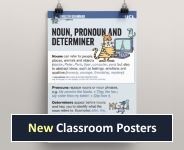Determiners: Advanced
The following is taken from Bas Aarts's Grammarianism blog.
In a recent blog post on terminology I mentioned the word class of determiners, and said that they are a relatively new word class.
By 'relatively new' I mean 'early twentieth century'. The National Curriculum Glossary definition, determiner, is very brief, here I'll expand on it.
- Articles: these are the best known determiners. The indefinite articles (a and an) are used when we assume that a hearer cannot identify the referent of the noun in front of which they appear. By contrast, definite articles are used when we assume that the hearer can identify the referent of the noun. In my earlier post I contrasted the phrases a cat and the cat. When I use the former I'm talking about a cat that you cannot identify. If, however, I use the definite article then I assume that you can identify the cat in question.
- Demonstrative determiners: these are determiners that have a 'pointing' (deictic) function. They identify the referent of a noun as nearby (this/these), or as distant (that/those). Some people talk of 'demonstrative adjectives', but this is a bad idea, for the same reason that 'possessive adjectives' are a bad idea (Listen to Bas Aarts on SoundCloud). Note that in the National Curriculum the demonstratives are treated as pronouns when they occur on their own, as in Jimmy likes that.
- Possessive determiners: these typically indicate possession, as in my hair, her bike, their teachers. They are not adjectives. What is a little bit confusing (and perhaps unfortunate) is that the National Curriculum Glossary actually seems to regard these words as belonging to both the class of determiners and the class of pronouns at the same time, as a quick look at the examples in the entries for determiner, pronoun and possessive will make clear. Perhaps a better label would have been 'determiner-pronoun' for these words, as some linguists have suggested. We could then also use this label for the demonstratives this, that, etc. Note that mine, yours, his, hers, ours, and theirs, which do not occur before nouns, are treated in the National Curriculum as possessive pronouns. Here's an example: These socks are mine.
- Quantifier determiners: this is a very general label which indicates that these determiners typically indicate a quantity of some sort. More specific labels are sometimes also used (see below).
What follows is a longer list of determiners (in part based on the Cambridge Grammar of the English Language; see also Bas Aarts's Oxford Modern English Grammar). As already noted, some of the labels used here are a bit more specific than those used in the National Curriculum.
Don't worry about the labels themselves. What's more important is to see which words in addition to those listed above are classed as determiners in English.
- The additive determiner: another. Example: Do you have another suggestion?
- Degree determiners: few, little, many, much. Example: Few people know about his plans.
- Disjunctive determiners: either, neither. Example: Either solution will do.
- Distributive determiners: each, every. Example: Each student will write two essays.
- Existential determiners: any, some. Example: Some people have all the fun.
- The interrogative determiner: which. Example: Which radio stations do you listen to?
- The negative determiner: no. Example: No amount of tea will satisfy her.
- Numeral determiners: one, two, three, etc. Example: We have three children.
- Personal determiners: Example: You people are always against our ideas.
- Positive paucal determiners: certain, a few, a little, several, various. Example: Several people arrived at the gate.
- The relative determiner: which. Example: He left at ten, at which point everyone sighed with relief.
- Sufficiency determiners: enough, sufficient. Example: I have enough bread to eat.
- Universal determiners: all, both. Example: All cats love milk.
As with the demonstrative determiners and the possessive determiners, many of these items can also occur on their own. They are then regarded as pronouns. Here are some examples:
- I went to the zoo to see the elephants, but I didn't see any.
- I love ice-cream. In fact, I'd love some right now.
Listen on SoundCloud
Welcome!

Englicious is totally free for everyone to use!
But in exchange, we ask that you register for an account on our site.
If you’ve already registered, you can log in straight away.
Since this is your first visit today, you can see this page by clicking the button below.

